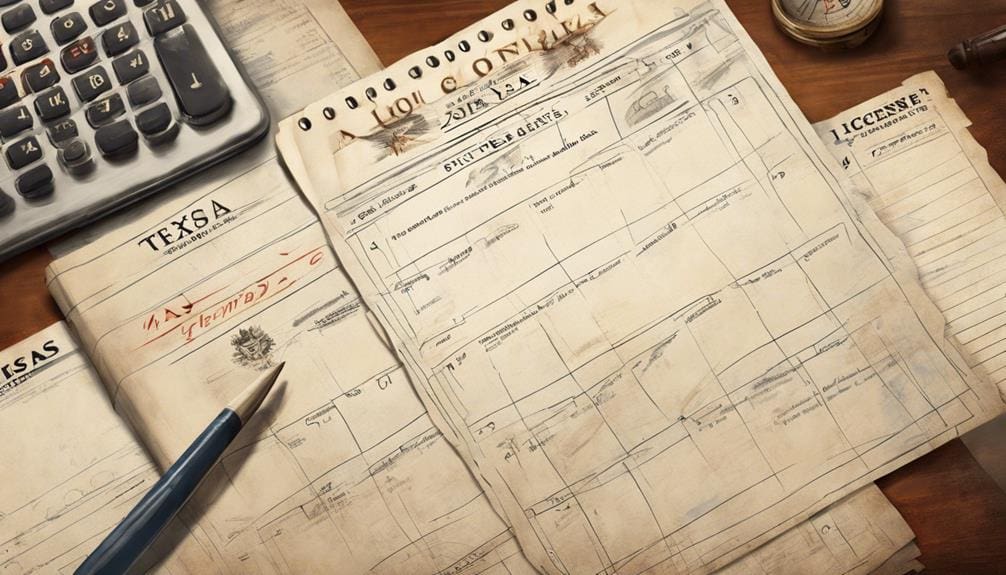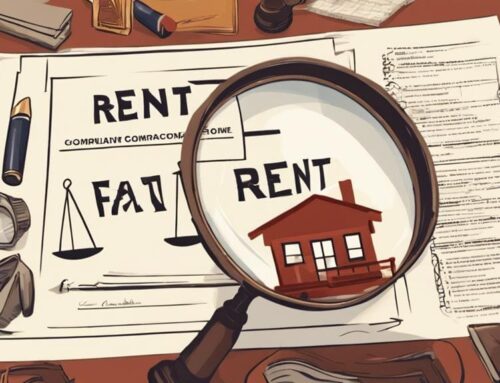Getting through Texas’ business licensing involves understanding both state and local requirements. Texas doesn’t issue a general operating license, but you’ll need to register your entity and obtain a Certificate of Formation or assumed name certificate. Most businesses require specific local permits, such as general operating licenses, sales tax permits, and specialized professional licenses. Costs vary, with renewal fees also applicable. Guarantee timely renewals to avoid penalties. Utilize resources like the Governor’s Small Business Resource Portal for support. To get detailed steps for every licensing aspect, explore further.
Key Takeaways
- Texas requires businesses to register with the Texas Secretary of State or county clerk.
- Obtain a sales use and tax permit for selling goods or services.
- Local jurisdictions often mandate additional business licenses and permits.
- Specialized businesses may need professional licenses and health department permits.
- Renewal of licenses is typically annual, with fees and penalties for late renewals.
Overview of Texas Business Licensing

When starting a business in Texas, you’ll need to understand that the state doesn’t issue a general business operating license, but local licenses are often required. Nearly all businesses in Texas must obtain some form of permit or license to operate legally.
Local business licenses are the most common type of license you’ll encounter, varying depending on your city or county’s regulations.
To comply with Texas’s licensing requirements, determine the specific business activities your enterprise will engage in. For instance, if your small business involves selling goods, you’ll need a sales tax permit, which is the only statewide licensing requirement. This permit allows you to collect and remit sales tax to the state.
Additionally, specific business activities may necessitate further permits or licenses. For example, if you operate a restaurant, health and safety permits are mandatory. It’s crucial to research and understand these specific requirements to guarantee your business operates within legal parameters.
General Business License Requirements

You don’t need a general business license to operate in Texas, but you must register your entity with the Texas Secretary of State or your county clerk.
Obtaining a Certificate of Formation or an assumed name certificate fulfills this obligation.
However, guarantee compliance with specific business permits and local licensing obligations by consulting the 2024-2025 Texas Business Licenses & Permits Guide and contacting local government offices.
Statewide Licensing Exceptions
In Texas, businesses aren’t mandated to acquire a general business operating license at the state level. The only statewide licensing requirement is the sales use and tax permit, which is crucial for businesses engaging in taxable sales.
While the state doesn’t dictate a general license, don’t overlook that nearly all businesses need some form of license or permit to operate legally.
Most cities and municipalities in Texas require businesses to obtain local business licenses. These local jurisdictions have their regulatory agencies that enforce legal requirements, and the specifics can vary widely.
Thus, while you won’t require a general business operating license from the state, you’ll likely need one from the local government where your business operates.
Understanding these distinctions can help you navigate Texas’s regulatory landscape more effectively. By focusing on the specific requirements of your city or municipality, you can guarantee compliance with all necessary legal frameworks.
Local Licensing Obligations
To adhere to local licensing requirements in Texas, businesses must obtain a general business operating license from their respective city or municipality. Each local jurisdiction has specific licensing requirements to guarantee that businesses operate legally. You’ll need to research these requirements thoroughly to meet all local licensing obligations.
Firstly, contact the appropriate local government office to determine the exact steps needed for obtaining your general business operating license. This office will provide detailed information on the forms and documentation required. Be prepared to obtain additional permits such as an occupancy permit, which verifies that your business location meets zoning and building codes, and a signage permit if you plan to display any exterior signs.
Failure to comply with these local licensing obligations can result in penalties or even the closure of your business. It’s essential to follow all guidelines set forth by your local jurisdiction.
Types of Business Licenses in Texas

Texas frequently requires various types of business licenses, including general operating licenses, sales tax permits, liquor licenses, and specialized professional licenses for fields like accounting or massage therapy. As a business owner, understanding these categories is essential for compliance and smooth operation.
Here’s a breakdown of some necessary Texas Business Licenses:
| License Type | Description |
|---|---|
| General Operating Licenses | Required for most businesses, ensuring legal operation. |
| Sales Tax Permits | Necessary for businesses selling goods or services; includes the sales and use tax permit. |
| Specialized Professional Licenses | For professions like accounting or massage therapy, Locksmith, mandates specific qualifications. |
| Health Department Permits | Required for food service establishments to meet health standards. |
LLCs and corporations in Texas often need specific business licenses that vary by industry and location. Online sellers must obtain a sales and use tax permit, while home-based businesses might require a home occupation permit.
Local business licenses differ by city and county, so it’s crucial to check with your local authorities. The Texas Department of Licensing and Regulation (TDLR) is an excellent resource for managing various business licenses and permits.
Steps to Obtain a Business License

To start, identify the specific licenses required for your business type and location in Texas.
Next, contact the appropriate local government office to obtain a general business operating license.
Identify Required Licenses
Start by researching the specific licenses required for your business type and location to guarantee compliance with Texas regulations. This step makes sure you’re aware of all necessary business licenses and permits, preventing legal complications down the road. Identify the exact requirements by referring to state and local government resources.
To get started, consider the following:
- General Business Operating License: Contact your local government office to obtain this essential license.
- Sales Tax Permit: If you’re selling taxable goods or services, apply for this permit through the Texas Comptroller.
- Specialized Permits: Depending on your business type, you might need additional permits like an occupancy permit or signage permit.
You’ll also want to verify if your profession requires specific licenses from the Texas Department of Licensing & Regulation. This step is important for compliance and uninterrupted operations.
For instance, if you’re opening a retail store, you’ll need a sales tax permit and possibly an occupancy permit to make sure your premises meet safety regulations. Additionally, a signage permit may be necessary for any business signs you wish to display.
Contact Local Authorities
Contact your local government office to gather specific information on the business licenses and permits needed for your operations. Establishing communication with local authorities guarantees you grasp and abide by all necessary regulations.
First, reach out to the local government office to inquire about obtaining a general business operating license. This is often the foundational step in legally operating your business. City or county offices can provide additional details on specific permits you might need, such as occupancy permits or signage permits. These permits ensure your business premises meet local safety standards and that your business signage adheres to municipal codes.
Local government websites are valuable resources offering detailed information on business licensing requirements in Texas. Utilize these websites to understand the steps involved and the documentation required.
Maintaining regular communication with local authorities helps you stay updated on any changes in licensing requirements or regulations. Ensuring compliance with these guidelines is essential for the legal and seamless operation of your business.
Costs of Business Licensing

In Texas, the cost of obtaining a business license varies widely, ranging from $15 to several hundred dollars, depending on the type of license required. Understanding these business license costs is essential for budgeting your startup expenses.
General business operating licenses generally fall on the lower end of the spectrum, but additional permits and specialized licenses can notably increase your expenses.
- General business operating licenses: These can range from $15 to several hundred dollars, depending on your business type and location.
- Specialized licenses: Professions like accounting or massage therapy require specialized licenses, which come with their own unique fees and renewal costs.
- Sales use and tax permits: These typically have no initial fee but may incur annual renewal fees.
It’s important to take into account additional permits that you might need, as these can add to your overall Texas business licensing fees. Renewal fees also play a noteworthy role, with penalties for late renewals further impacting your budget.
Profession licensing fees are another factor, often tied to the specific business activity you engage in. By understanding these costs upfront, you can better prepare for the financial commitments associated with maintaining compliance in Texas.
Renewal Process for Licenses

Renewing your Texas business license annually guarantees that your business operations remain legally compliant. The renewal process for Texas business licenses is straightforward but varies depending on the license type. The issuing authority will typically send renewal notices via mail or email, reminding you of upcoming renewal deadlines.
To avoid penalties or fines, it’s essential to mark these deadlines on your calendar. Failure to renew on time could disrupt your business operations. Each license type may have specific guidelines you need to follow during the renewal process, so be sure to review the instructions provided by the issuing authority carefully.
Start the renewal process well before the deadline to make sure you have ample time to gather necessary documents and complete any required steps. Renewing your license not only keeps you legally compliant but also reinforces your commitment to ethical business practices within the Texas business community.
If you encounter any issues or have questions about the renewal process, contact the issuing authority directly for clarification. Staying proactive in managing your Texas business licenses demonstrates your dedication to maintaining the highest standards in your industry, fostering a sense of belonging and trust among your clients and peers.
Resources for Small Businesses

Exploring the landscape of Texas business resources is essential for small business owners to thrive and grow. Finding business licenses and permits can be challenging, but Texas offers a wealth of resources to support you.
Key tools include the Governor’s Small Business Resource Portal, which provides tailored support for starting a business. This portal is invaluable for understanding Texas licensing requirements and ensuring compliance.
Engaging with available resources can simplify your journey. Consider these options:
- Governor’s Small Business Handbook: A detailed guide for business planning and operations, offering vital insights into Texas-specific requirements.
- Webinars and Events: Attend small business webinars to gain valuable insights and network with fellow entrepreneurs.
- Business Permit Office: This office offers practical assistance with licensing and permitting, helping to streamline your compliance process.
Subscribing to small business emails ensures you receive timely updates and notifications about new resources and opportunities. The Governor’s Small Business Resource Portal also offers personalized advice tailored to your specific needs.
Using these resources can provide you with the guidance and support necessary to successfully navigate the complexities of business licenses and permits in Texas.
Tracking License and Permit Information

Efficiently tracking your business licenses and permits is vital to maintaining compliance and avoiding costly penalties. Begin by securely storing all license and permit numbers for easy access. This guarantees you can promptly reference any required documentation.
Tracking renewal dates is essential. Missing a renewal can result in lapses in compliance, potentially leading to fines or operational disruptions. Utilize a License and Permit Tracker template to organize these dates systematically. This template can help you monitor both federal, state, and local permits, reducing the risk of oversight.
Incorporate a structured format to manage your compliance obligations. Maintain a secure record of all federal, state, and local permit information. This approach not only enhances organization but also guarantees you can quickly retrieve necessary details when needed.
For specific questions about business licenses and permits, direct your inquiries to the Business Permit Office. They provide valuable assistance and can clarify any uncertainties you might have.
Frequently Asked Questions
Is It Required to Have a Business License in Texas?
Yes, you need a business license in Texas. While the state itself doesn’t issue a general business operating license, most cities mandate one.
Also, nearly all businesses must secure specific licenses or permits to operate legally. Don’t forget to obtain a sales use and tax permit for your Texas-based business.
These steps guarantee you’re compliant and part of the thriving Texas business community.
What Permits Are Needed for an LLC in Texas?
So, you’re diving into the world of LLCs in Texas?
First, let’s smooth out the rough edges. You’ll need a Certificate of Formation filed with the Texas Secretary of State, which costs $300 by mail or $310 online.
Next, a sales and use tax permit is essential. Depending on your industry, additional permits might apply.
Remember, your LLC provides limited liability protection, keeping your personal assets safe.
Welcome to the Texas business family!
Do Independent Contractors Need a Business License in Texas?
Independent contractors in Texas generally don’t need a specific business license to operate. However, you must comply with industry-specific licensing requirements for your services.
Register with the Texas Secretary of State and obtain necessary permits. Be aware that some cities or counties may mandate a general business license.
It’s essential to research and understand all licensing obligations in your area to make sure you’re operating legally and within community standards.
How Much Does It Cost to License a Business in Texas?
When licensing a business in Texas, you’re looking at a modest investment. General licenses range from a mere $15 to several hundred dollars, depending on your business type.
Don’t forget, sales use and tax permits are typically free. However, specialized licenses and permits might add to your costs.
Keep in mind, annual renewal fees can also apply, impacting your budget. This structured approach guarantees you belong in the thriving Texas business community.
Conclusion
Sailing through Texas business licensing is like piloting a ship through vast waters. Mastering general requirements, understanding license types, and following proper steps guarantee your venture sails smoothly.
Keep an eye on costs, renewals, and leverage resources to avoid legal storms. By meticulously tracking your licenses and permits, you chart a course toward success.
Remember, in the sea of commerce, preparation and compliance are your compass and anchor. Safe travels on your business journey!









